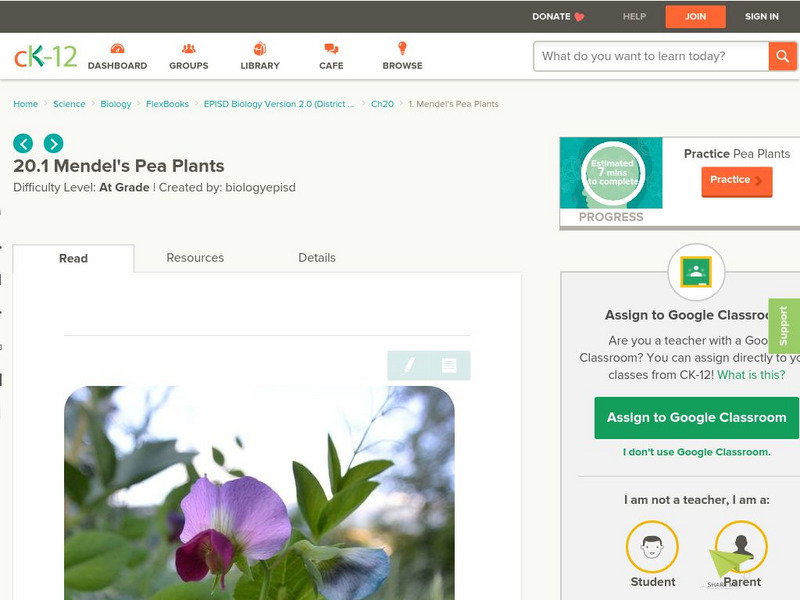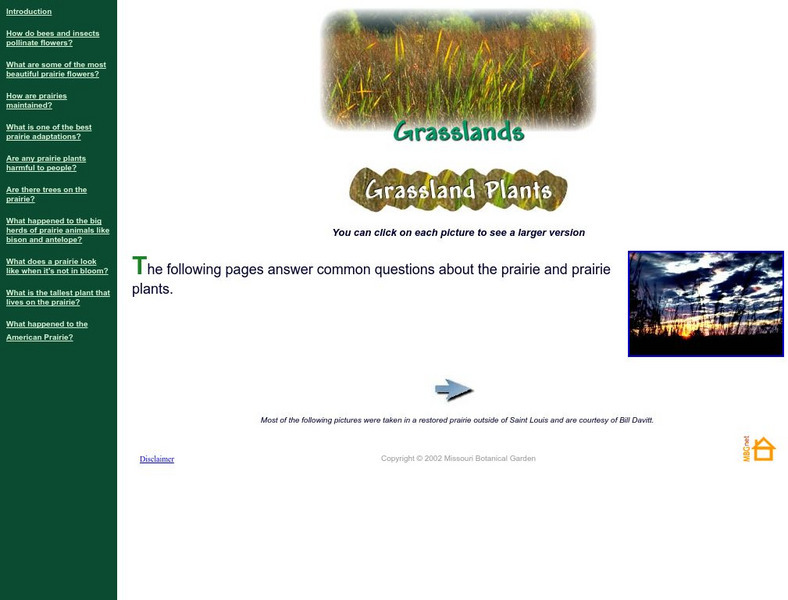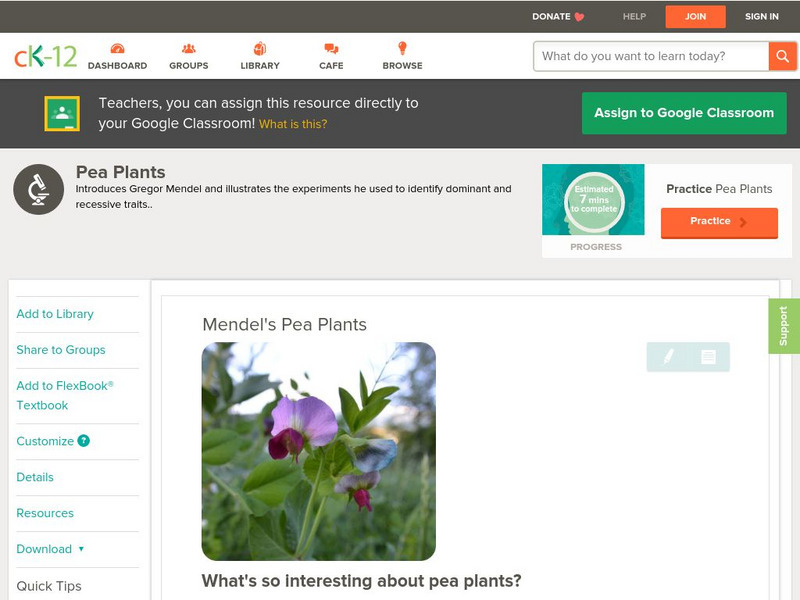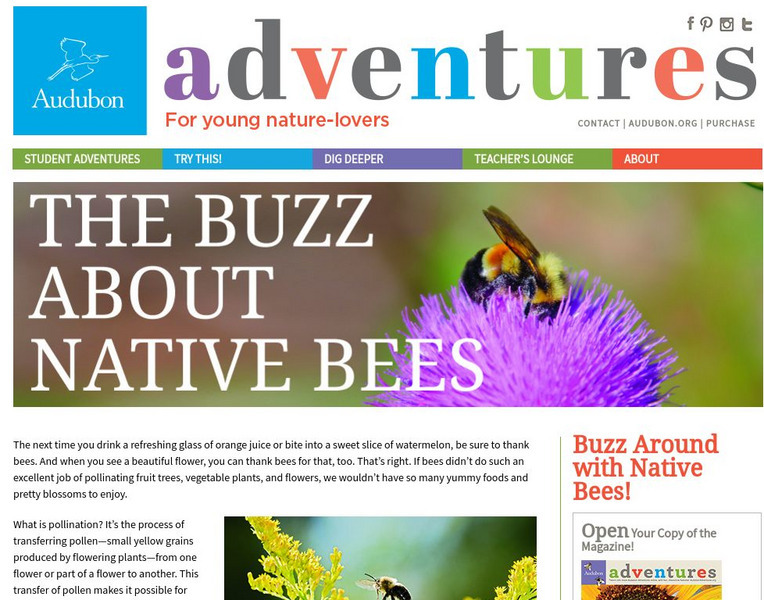CK-12 Foundation
Ck 12: Biology: Flowering Plants
[Free Registration/Login may be required to access all resource tools.] Describes the parts of a flower and the classification and evolution of flowering plants.
Other
Science and Kids Activities: Pollination and Seed Dispersal
Second graders learn how plants depend on animals to disperse their seeds. Students will learn about ways that animals can disperse seeds. They will design their own model and compare it to the real action of plants and animals. In the...
CK-12 Foundation
Ck 12: Episd: Mendel's Pea Plants
[Free Registration/Login may be required to access all resource tools.] A breakdown of biologist Gregor Mendel's genetic experiments with pea plants to clarify controlling self and cross pollination.
Missouri Botanical Garden
Missouri Botanical Garden: Grassland Plants
This site from the Missouri Botanical Garden explores some commonly asked questions about the prairie and prairie plants.
Discovery Education
Discovery Education: Plants
The Discovery Channel provides numerous lesson plans dealing with plants. Content is organized by grade level, but all lesson plans include suggestions for adaptations for older or younger audiences.
US Forest Service
Usda: Environmental Benefits of Pollination
In addition to extolling the virtues of flowering plants, this effective site provides several interesting fun facts related to pollination.
Mocomi & Anibrain Digital Technologies
Mocomi: Reproduction in Plants
Discusses reproduction in plants either sexual or asexual and describes reproduction parts and pollination.
Scholastic
Scholastic: Study Jams! Science: Plants: Flowers
A video and a 7-question multiple-choice quiz on the structure and functions of flowers.
Ducksters
Ducksters: Biology for Kids: Flowering Plants
Kids learn about flowering plants in the science of biology including their life-cycle, structures of a flower, fruit, seeds, and pollination.
Biology Pages
Kimball's Biology Pages: Sexual Reproduction in Angiosperms (Flowering Plants)
This site, from retired Harvard professor John W. Kimball, provides a detailed but understandable explanation of sexual reproduction in flowering plants. Includes informative, well labelled illustrations.
Cold Spring Harbor Laboratory
Dna From the Beginning: Some Genes Are Dominant
Learn about the principle of dominance as you watch animations showing Mendel's experiments with pea plants. Find out what happened when he crossed plants that produced green seeds with those that produced yellow seeds.
Cold Spring Harbor Laboratory
Dna From the Beginning: Genetic Inheritance Follows Certain Rules
Find out what happened when Mendel crossed two hybrid pea plants. The animations do a good job explaining why these crosses produce a 3:1 ratio of traits.
Science & Plants for Schools
Science & Plants for Schools: Pollination, Fertilization, Fruits [Pdf]
Great PDF to teach students about plant reproduction and life cycle. There are many teacher printables.
CK-12 Foundation
Ck 12: Biology: Mendel's Pea Plants
[Free Registration/Login may be required to access all resource tools.] An overview of Mendel's pea plant experiments.
Other
Biology: Evolution of Sexual Reproduction
This paper, the work of a Ph.D. researcher, presents an interesting discussion of the reasons that assexual reproduction is not used by most organisms. Toward the end is a specific discussion of reproduction in plants. Advantages and...
Other
Unusual Pollination: Bee Orchid
Some flowers have developed adaptations that lure insects to them for pollination. Visit this website to learn about the very unusual adaptations of the bee orchid.
Other
Clermont College: Coevolution and Pollination
The first part of this page explores coevolution by giving some examples.
Nature Conservancy
Nature Works Everywhere: Garden Tip Sheets
Four tip sheets on how to grow a rain garden, a pollinator garden, a native habitat garden, and a school garden. Includes links to lots of resources.
Other
Rose Hills Foundation Conservatory for Biological Science
All about plants has information on plant parts--seeds, flowers, fruits, roots, and spores--and plant processes--seed dispersal, germination, pollination, and photosynthesis. You can also take a tour of this Los Angeles-based...
National Audubon Society
National Audubon Society: Audubon Adventures: The Buzz About Native Bees
Resources for learning about the important role bees play in pollinating plants, especially those we eat. Includes a student magazine full of information about bees, an interactive pollination chart, and a quiz.
University of Maryland
University of Maryland: Plant Biology
A webpage for a course on plant biology for non-science majors. The course covers how plants function, diversity among plants, and the roles of plants in the environment. Site includes lectures, a plant project, and a sample exam.
PBS
Pbs Learning Media: Floral Arrangements
Explore a few of the ways plants pollinate each other in this video segment from Sexual Encounters of a Floral Kind.
University of Illinois
University of Illinois Extension: Plantenstein Is the Suspect!
Detective Le Plant has discovered that one plant can produce many other plants. He needs you to help him find out how this happens. Follow along and learn about the parts of flowers and reproduction. Along the way, you will be quizzed!
PBS
Pbs Learning Media: American Chestnut Tree
This annotated slideshow adapted from KET's Electronic Field Trip to the Forest illustrates how blight decimated the American chestnut tree and the methods scientists use to identify and pollinate the remaining trees to create...

















